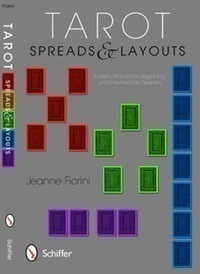By Jeanne Fiorini
I’m always very flattered when clients or students suggest I tackle some sort of Tarot project for which I feel totally unprepared and/or eminently incapable of accomplishing.
Such is the case with “When are you going to make your own Tarot deck?” This suggestion was readily addressed via Pinterest as outlined in my August 17th blog post: http://jeannefiorini.wordpress.com/2012/08/17/jeannes-version-of-creating-a-tarot-deck. I highly recommend this method of deck creation as a very enjoyable exercise, plus the fact that most of us don’t have two or three years of life ready to devote to such a grueling undertaking.
Another comment coming from clients and students is the request to write/talk/blog about card combinations, i.e. how to interpret cards when they come in pairs or groups, how they inter-relate, and how meanings change when they appear in tandem with other cards.
To this request I reply, “Is $10 enough?”
You’ll say, “Uh … what?”
I’ll say, “What do you mean?”
You’ll say, “Is $10 enough for what?”
“Exactly!”
If the question is “Is $10 enough to cover coffee and a muffin?” then the answer probably is yes. If the question is “Is $10 enough for a down payment on a house?” then the answer is probably no.
This same analogy holds true for card meanings— valid interpretations will always be a function of their relevance to the context of the question. A reading is made exceedingly -- and unnecessarily -- difficult without the expression of a query or a context in which to hold the response from the cards.
Many of you are probably shaking your head in disagreement here, maybe because you don’t find it tough to do a “cold reading” or you don’t mind the challenge of it. The following comment, made in response to last month’s article in this column, could be a common sentiment:
Recently I was asked to do a reading for someone whom I don't really know. That's ok, but she didn't want to tell me what her question was; also ok, but it made it much more difficult for me to interpret the cards both individually, and as a gestalt reading. I was struggling to make it all cohesive and coherent! However, afterwards she found the reading right on target, and said it was extremely helpful. When she told me what her question was I could see that it truly was relevant.
Maybe I’m being a stubborn ol’ B, but I don’t like being put into this position. It’s like going to the doctor’s office and making them guess your symptoms. Why do we allow clients to put us in the position of making it difficult for [us] to interpret the cards both individually and as a gestalt reading?
If it’s a matter of a client’s “privacy” - which sometimes is a control issue on the part of the questioner – there are ways for readers to get around that and still maintain some semblance of knowing where they’re headed, of which aspects of the cards to attend, and at least to have, as the commenter mentioned, a feeling for the gestalt of the reading.
Here are some of the round-about ways I typically address a query when I’m being forced to aim pointedly at a vague target:
1. What is the most important thing for me to know about X?
2. What is my best attitude or approach to X?
3. Is it in my best interest to do/work with/be involved in X?
4. What can help me be successful with X?
5. What is hindering a positive outcome with situation X?
6. What is a lesson to learn about situation X?
7. What would my highest wisdom advise regarding situation X?
Those types of queries usually get us somewhere. However, even if you determine these gyrations to be of value, here’s the rub: If the client “doesn’t get it,” a reading can be true as the sunrise and it won’t matter.
Like beauty, truth is in the eye of the beholder. It’s our job as readers to speak truthfully, but we can’t force belief. Without our words hitting a resonant chord somewhere within the client, even the most meaningful words just lie there, waiting for someone to pick them up off the table.
This is the moment; the true test of a reader’s integrity: how firmly we are willing to stick to our story? Rephrasing a response to make things more understandable is one thing; reformulating a response to make things more palatable is another. And I suppose that is a topic for another day.
Let it be enough to consider here, this notion of trying to provide an answer without knowing the question. It would be ideal if we didn’t have to do it, but there are ways around it if we do.
